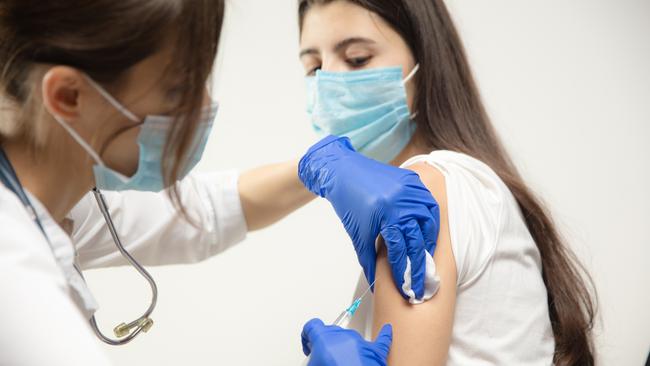Why talk of ‘double-digit’ premium hikes in the Ramsay, Bupa spat damages private healthcare
There can be no winners in Bupa and Ramsay’s funding stalemate.

Business
Don't miss out on the headlines from Business. Followed categories will be added to My News.
Cost of living pressures have become the centre of a bitter feud between Bupa and Ramsay, with the health fund accusing Australia’s biggest private hospital group of behaviour that will spark “double-digit” premium increases.
Ramsay sent Bupa a termination notice late on Wednesday after funding negotiations failed, arguing that hospital costs are rising at a time Australia’s health insurance sector banked a record $1.8bn profit last year.
It was a bold move – even from a company as big as Ramsay – given the British health fund represents four million Australians.
Bupa and the health insurance lobby group Private Healthcare Australia (PHA) retaliated swiftly, accusing Ramsay of seeking an “unreasonably high rates of increase” to beef up “the value of its business” in the wake of a $20bn takeover offer from KKR.
PHA chief executive Rachel David even warned that if Ramsay’s “demands are met” Australians will face double-digit premium increases – a mighty jump from this year’s average of 2.7 per cent.
Dr David accused Ramsay of “ethically wrong” conduct “as waiting times for surgery and cost of living pressures are spiralling”, while Bupa’s health insurance boss Chris Carroll has branded Ramsay’s behaviour as an “affront to Australians”.
Never before have Australians witnessed such behaviour that does little to inspire confidence in Australia’s private health care system.
And if anyone is wondering why Ramsay is yet to attract a suitor other than KKR, a fight like this is perhaps why. Nobody likes a dysfunction, particularly when the health of Australians is at stake.
Before the pandemic, Australians – mainly the young and healthy – were withdrawing from private health insurance in droves, while the traditional symbiotic relationship between the public and private health system had hit its nadir.
While Covid-19 has increased waiting lists for treatment at public hospitals, causing more people to sign up to private health insurance, it is not known if that is an aberration and pre-pandemic trends will return. Therefore, all private health care participants must work together to increase participation.
But Bupa argues that the funding increase Ramsay is demanding will “significantly increase premiums for customers across the sector”. But what exactly was Ramsay demanding?
Neither party would comment on negotiations. But it is understood when talks began in November – long before KKR lobbed its takeover bid – Bupa offered a funding increase of around 1 per cent while Ramsay indicated hospital costs had risen up to 7 per cent during the pandemic.
Normally in negotiations, parties involved will go back and forth before meeting somewhere in the middle. Both sides may be slightly aggrieved they didn’t get what they each wanted, but that is a sign of a fair outcome.
It is understood there was very little, if any, movement with Bupa and Ramsay.
In its last funding agreement – which came at a time that Bupa was battling the fallout of the aged care royal commission – Ramsay accepted a funding rise from Bupa in the 1 per cent range.
Bupa has since been implementing a range of recommendations from McKinsey & Co, to review its business after it found itself lagging behind its competitors.
Meanwhile, elective surgery restrictions and Covid-related costs such as personal protection equipment have wiped hundreds of millions of dollars off private hospital earnings. Ramsay says it is in a strong position to cater for a backlog in surgeries but estimates when health care volumes will return to normal are difficult to forecast.
Just last week, Ramsay reported a 59 per cent slump in profit in the three months to March 31. Its shares have since fallen 3.7 per cent to $78.48 – way below KKR’s offer of $88 a share.
And since issuing Bupa its termination notice, Ramsay shares have eased 0.7 per cent.
While it may have been inflammatory for Ramsay to highlight the health insurance sector’s record $1.8bn profit, it is not alone in this regard. Health funds have been under pressure not to bank ‘Covid savings’ with the Australian Competition and Consumer watching closely.
More Coverage
Originally published as Why talk of ‘double-digit’ premium hikes in the Ramsay, Bupa spat damages private healthcare




